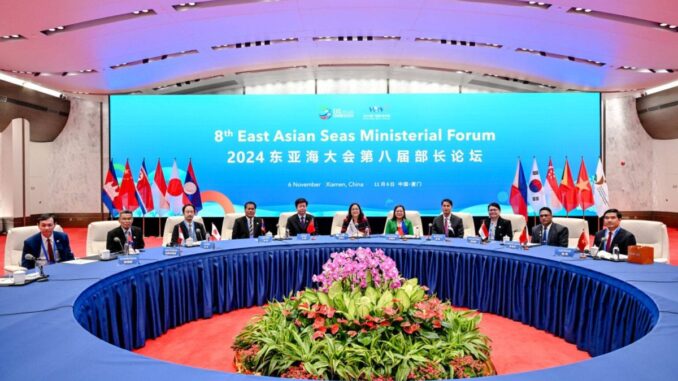
THE 8th East Asian Seas (EAS) Congress Ministerial Forum, held on Nov. 6, 2024, at the Xiamen International Convention Center, saw high-level representatives from 10 Partnerships in Environmental Management for the Seas of East Asia (Pemsea) member countries reaffirm their commitment to sustainable development for the East Asian Seas.
Attended by leaders from Cambodia, China, Indonesia, Japan, Lao PDR, the Philippines, the Republic of Korea, Singapore, Timor-Leste and Vietnam, the forum centered on addressing challenges in the region and sharing strategies to manage marine resources sustainably.
SAVING THE OCEAN. High-level representatives from 10 country partners of the Partnerships in Environmental Management for the Seas of East Asia reaffirm commitments and discuss the best ways for East Asian countries to embrace sustainable development. CONTRIBUTED PHOTOS by GREGG YAN
The forum serves as a critical platform, occurring every three years, where nations exchange ideas to preserve and sustainably develop East Asia’s seas and coasts.
A key outcome was the countries’ continued alignment with the Strategic Development Strategy for the Seas of East Asia (SDS-SEA), a framework aimed at guiding sustainable development policies across the region.
One focal area of the forum was fostering “blue financing” to support economic growth in marine and maritime sectors, as highlighted by Indonesia’s Dasrul Chaniago. He emphasized that Indonesia, the world’s largest archipelago, requires significant investment to harness the blue economy’s potential.
Meanwhile, Korea’s Yoon Hyunsoo underscored the importance of digital technology, like marine climate observation networks and innovations in renewable energy from tidal and wave power.
“Blue finance is essential for growth,” said Dasrul Chaniago from Indonesia’s Ministry of Environment and Forestry. “We are the world’s largest archipelago, so embracing the blue economy can improve the welfare of our people. The average annual investment required for the sustainable development of our marine, maritime and fisheries sectors is IDR 3.64 trillion, but we might eventually need many times that.”
“Technology is important. We are focusing on digital technology such as marine climate observation networks and are developing smarter ways to generate renewable energy from the sea via tidal and wave power,” said Yoon Hyunsoo from the Republic of Korea’s Ministry of Oceans and Fisheries.
Additionally, country representatives noted their unique conservation solutions. Japan’s Toru Ono, for instance, pointed out the significance of Japan’s seagrass beds and mangroves as essential blue carbon ecosystems in the country’s goal of achieving carbon neutrality by 2050.
The forum concluded with delegates reaffirming their commitment to SDS-SEA’s goals, which focus on effective governance, a resilient ocean, sustainable and inclusive economies, and the health of people.
In her closing remarks, Pemsea Executive Director Aimee Gonzales emphasized the importance of regional cooperation to achieve UN Sustainable Development Goals and targets like the 30×30 initiative by 2030.
“We warmly welcome assistance from other countries to further build our capacity,” added Paris Chuop from Cambodia’s Ministry of Environment. “We should all cooperate because no single country owns the vastness of the ocean.”


Be the first to comment